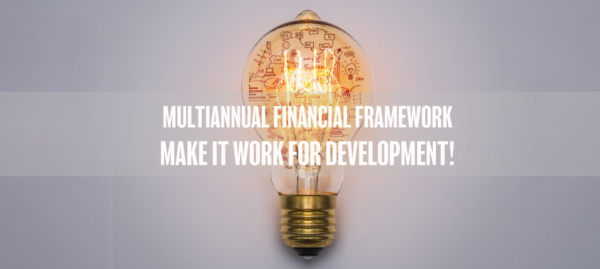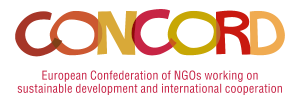
The proposal from the Commission:
On the 2nd of May, the European Commission will launch its communication on the future EU budget, called the Multi-annual Financial Framework (MFF 2021-2027). This communication will give a first overview of the main budget architecture and the ressources allocated by EU Member States.
When it comes to the External Instrument (the instrument upon which development cooperation rests), the proposal on the table from the Commission is to create a single instrument by merging 12 different existing instruments. Another key element of the proposal is to increase the share of non-DACable actions, i.e. opening up to non-ODA eligible areas, as currently defined by the Development Committee (DAC) of the OECD.
Why are we concerned?
These proposals have a series of advantages, as it represents an opportunity to simplify the current architecture and to avoid duplication as well as ensuring greater coherence and complementarity between instruments. Nevertheless, CONCORD is concerned that this proposal will not allow the EU to live up to its commitments on poverty eradication and sustainable development.
The main concerns are the following:
- Diversion of funds: The EU foreign interests would take over development cooperation objectives. The instrumentalisation of aid is already happening (the latest aid statistics confirm it) but having a single external instrument would exacerbate the situation. The single instrument would provide the framework justifying such mechanisms and increase the risks of development cooperation being subordinated to broader external relation objectives. Aid should aim at implementing the 2030 Agenda, but would risk serving some short-term migration goals and/or long-term security purposes instead.
- Aid objectives first: With the lack of clarity on the criteria for allocation of funds, aid could be diverted towards the promotion of Development Finance Institutions (DFIs) and private investments. Delivering on the SDGs, human rights, democracy and civil society space should be the core mission of all ODA disbursements. As long as financial instruments, like blending and guarantees, do not fulfil concrete-evidence based criteria, the ressources allocated to these cannot increase.
- Impact on beneficiaries: One instrument would mean that some specific geographical scopes and some thematic programmes are lost. The one-pot-for-all approach would impact negatively some regions benefiting from the EU budget as well as some key transversal issues like gender equality. This means that a more substantial share of EU aid should be allocated to Least Developed Countries, a primary target of ODA. Today, the Middle Income and Most Advanced Countries benefit progressively more from ODA (due to internal interests guiding the allocation of funds). We need to safeguard the 0.2% of GNI target.
- Democratic ownership: CONCORD is concerned that the single instrument would weaken the accountability on the budget from the European Parliament and Member States in favour of flexibility for the European Commission.
- The flexibility at the expense of predictability: On top, CONCORD is concerned by the 20% unallocated reserve which could even reinforce the risks mentioned above. Internal and short-term interests would prevail over long-term sustainable objectives. The accountability of such mechanisms is also questionable.
